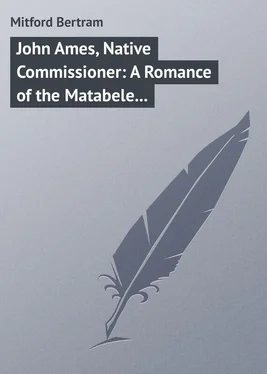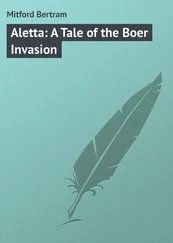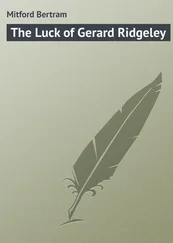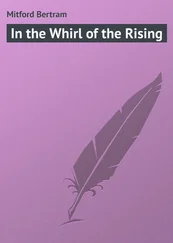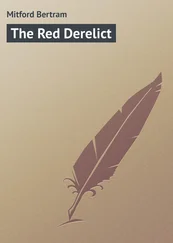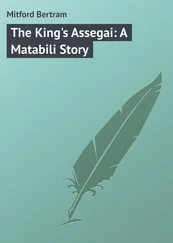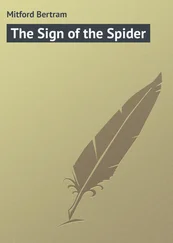Bertram Mitford - John Ames, Native Commissioner - A Romance of the Matabele Rising
Здесь есть возможность читать онлайн «Bertram Mitford - John Ames, Native Commissioner - A Romance of the Matabele Rising» — ознакомительный отрывок электронной книги совершенно бесплатно, а после прочтения отрывка купить полную версию. В некоторых случаях можно слушать аудио, скачать через торрент в формате fb2 и присутствует краткое содержание. Жанр: foreign_prose, на английском языке. Описание произведения, (предисловие) а так же отзывы посетителей доступны на портале библиотеки ЛибКат.
- Название:John Ames, Native Commissioner: A Romance of the Matabele Rising
- Автор:
- Жанр:
- Год:неизвестен
- ISBN:нет данных
- Рейтинг книги:3 / 5. Голосов: 1
-
Избранное:Добавить в избранное
- Отзывы:
-
Ваша оценка:
- 60
- 1
- 2
- 3
- 4
- 5
John Ames, Native Commissioner: A Romance of the Matabele Rising: краткое содержание, описание и аннотация
Предлагаем к чтению аннотацию, описание, краткое содержание или предисловие (зависит от того, что написал сам автор книги «John Ames, Native Commissioner: A Romance of the Matabele Rising»). Если вы не нашли необходимую информацию о книге — напишите в комментариях, мы постараемся отыскать её.
John Ames, Native Commissioner: A Romance of the Matabele Rising — читать онлайн ознакомительный отрывок
Ниже представлен текст книги, разбитый по страницам. Система сохранения места последней прочитанной страницы, позволяет с удобством читать онлайн бесплатно книгу «John Ames, Native Commissioner: A Romance of the Matabele Rising», без необходимости каждый раз заново искать на чём Вы остановились. Поставьте закладку, и сможете в любой момент перейти на страницу, на которой закончили чтение.
Интервал:
Закладка:
No relief came into the face of the sufferer. The awful fate predicted for her by Shiminya seemed to her just as certain as though it had already befallen her, and the recollection of the horrid animal tearing at her flesh was too recent. It was a form of superstition, too, not unknown among her people, and here everything seemed to bring it home – time, place, surroundings, and the horror of this gruesome being’s presence. But before she would utter further prayer or protest, a strange hollow, humming noise was heard, at sound of which Shiminya arose suddenly, with an eager look on his repulsive countenance, and crept out of the hut, taking care to secure the door behind him.
Chapter Four.
A Human Spider
Shiminya resumed his seat upon the ground, with the múti bowl in his hands. The wolf he had already secured in one of the huts. The grim beast was in truth his familiar spirit, and as such not to be gazed upon by profane eyes, and in broad daylight. And now footsteps were heard approaching the scherm , together with the rattle of assegai hafts. Three men entered by the narrow gateway. Shiminya looked up.
“Greeting, Izinduna ,” he said.
“Greeting to thee, Umtwana ’Mlimo,” came the reply in a deep-voiced hum, as the newcomers deposited their assegais just within the gate, and advanced a few steps nearer in. With two of these we are already acquainted, they being, in fact, Madúla and his brother Samvu. The third was another influential chief by name Zazwe.
Shiminya seemed to take no further notice of their presence, continuing to sway the múti bowl from side to side, muttering the while. The faces of the three indunas wore an expression of scarcely to be concealed disgust; that of Zazwe in addition showed unutterable contempt. He was an unprepossessing looking man, lean, and of middle height, with a cold, cruel countenance. At bottom he loathed and despised the whole Umlimo hierarchy as a pack of rank impostors, but it suited him now to cultivate them, for he was an arrant schemer, and would fain see every white man in the country cut to pieces.
“There are three goats in thy kraal beyond the river, Shiminya,” he began presently, tired of the silence.
“That is good, my father,” the sorcerer condescended to reply. “They are for Umlimo?”
“Nay; for his child.”
“And – for Umlimo?”
“There is a young heifer.”
“ Au ! Of such there will soon be no more,” replied Shiminya.
“No more?” echoed the trio.
“No more. The whites are bewitching all the cattle in the land. Soon you will see great things. The land will stink with their rotting carcases.”
A murmur went up from the three listeners. They all bent eagerly forward. Shiminya, who knew his dupes, was in no hurry. He continued to shake his bowl of abomination and mutter; then he went on:
“The last time you heard the Great Voice, what did it say? Were not the words thereof as mine are now – I, its child? Whau ! I fear there were some who heard that voice and laughed, Izinduna – who heard that voice and did not believe.”
At this juncture there came a subdued wail, inexpressibly doleful, from one of the huts. It was answered by a snarl from another. Two of the three chiefs, listening, felt perturbed, the countenance of Zazwe alone preserving its hard, sceptical expression; though, to tell the truth, even he – so rooted is the innate superstition of savages – did not feel entirely at ease in his surroundings.
“There is, further, a good milch cow for the Umlimo,” spake Madúla, “and for his child a heifer.”
“It is well. There will soon be no more,” repeated the wizard.
“And three fat-tailed sheep, and for Umlimo a young bull,” said Samvu.
“That, too, is good,” was the cold acknowledgment of Shiminya, “for there will soon be no more.”
Now, cattle constitute the very life of all the South African tribes, wherefore the three chiefs felt their hearts sink as they realised the gist of this doleful prophecy. The rinderpest had not as yet made its appearance in their midst, but was very soon destined to do so, and the sorcerers of the nation, having gained secret information that the terrible scourge was, in the ordinary course of things, bound to be upon them soon from further north, used their knowledge as a most powerful lever towards promoting the uprising they were straining every nerve to bring about. In this they found willing aid from many of the chiefs, who saw their power and influence waning day by day; themselves forced to be the subservient vassals of a few – from their point of view – upstart and arrogant whites.
“Why, then, should Makiwa (Matabele term for the white man) wish to bewitch all the cattle?” said Madúla, who at present was in the vacillating stage, though the high-handed action we have recorded, on the part of the native police, had gone far towards settling him in the wrong direction. “They will suffer equally with ourselves.”
“ Our cattle are our life. Their life is in other things,” pronounced Shiminya, who never looked at his interlocutors when he spoke, thus giving his answers an oracular air, as though inspired by the magic stuff into whose black depth he was gazing. “We die. They live.”
“ Hau !” cried the listeners, fully comprehending the hint.
“Not many times will the moon be at full before this death is upon us,” went on the wizard, still without looking up. “If there are no whites left in the land, then will it be averted.”
Again that hollow groan proceeded from the hut. Their feelings worked up to an artificial pitch, the superstitious savages felt something like a shudder run through their frames. But the imperturbable Shiminya went on:
“There are two who must die – Pukele, the son of Mambane.”
“He who is servant to Jonemi?” queried Madúla.
“The same.”
“Has he done wrong?” said Samvu, for the man named was one of Madúla’s people, and neither of the brothers liked this edict.
“He knows too much,” was the remorseless reply. “The other is Ntatu, formerly wife of Makani.”
A measure of relief came into the countenances of the two chiefs. A woman more or less mattered nothing, but they did not like to sacrifice one of their men.
“It is the ‘word’ of Umlimo,” pursued Shiminya, decisively. “This must be.” And for the first time he raised his eyes, and fixed them upon the two chiefs with cruel, snake-like stare.
“What is the life of a man, more or less, when Umlimo has spoken?” said Zazwe, thus throwing in the weight of his influence with the dictum of the sorcerer. “A man, too, who is faithful to one of these whites set over us! Au ! Umlimo is wise.”
This carried the day; and after some more talk, mostly “dark,” and consisting of hints, the three chiefs, gathering up their assegais, withdrew.
Left alone, Shiminya still sat there, satisfied that his sanguinary edict would be carried out. A dead silence reigned over the great thorn thicket, and as though the satanic influence which seemed to brood upon the place imparted itself to wild Nature, even the very birds forbore to flutter and chirp in its immediate vicinity. The sun sank to the western horizon, shedding its arrows of golden light upon the myriad sharp points of the sea of thorns, then dipped below the rim of the world, and still the grim wizard squatted, like a crafty, cruel, bloodthirsty spider, in the midst of his vast web, though indeed the comparison is a libel on the insect, who slays to appease hunger, whereas this human spider was wont to doom his victims out of a sheer diabolical lust of cruelty and the power which he could sway through that agency. This day, indeed, he might feel content, for it had not been wasted. But the day was not over yet – oh no – not quite yet. Still, would it be possible for this satanic being to commit further deeds of atrocity and of blood? Well, is there not the wretched sufferer lying bound and helpless within the hut?
Читать дальшеИнтервал:
Закладка:
Похожие книги на «John Ames, Native Commissioner: A Romance of the Matabele Rising»
Представляем Вашему вниманию похожие книги на «John Ames, Native Commissioner: A Romance of the Matabele Rising» списком для выбора. Мы отобрали схожую по названию и смыслу литературу в надежде предоставить читателям больше вариантов отыскать новые, интересные, ещё непрочитанные произведения.
Обсуждение, отзывы о книге «John Ames, Native Commissioner: A Romance of the Matabele Rising» и просто собственные мнения читателей. Оставьте ваши комментарии, напишите, что Вы думаете о произведении, его смысле или главных героях. Укажите что конкретно понравилось, а что нет, и почему Вы так считаете.
